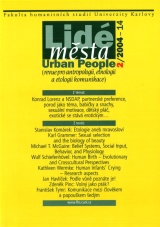Konrad Lorenz a klasická etologie ve východním bloku
DOI:
https://doi.org/10.14712/12128112.4394Abstrakt
From 1963 to 1989, the conceptual framework of Konrad Lorenz, the founder of ethology as a scientific field, had been criticized for ideological reasons in Eastern Socialist block countries. The ideas of Lorenz that follow both the theories of earlier German biologists from the break of 19th and 20th centuries [von Uexküll, Heinroth] and classic Darwinism, were directly at odds with the Marxist-Leninist concept of human nature as well as the official materialist-dialectic doctrine in science. The entirety of Lorenz´s reflections aboutmostly inherent origin of human behaviour is incompatible with the Marxist-Leninist idea of a human that is completely, or to a large extent, modifiable by culture. Attitudes towards research of animal behaviour varied in each of the socialist countries. Following the Second World War, the USSR continued with the tradition of comparative psychology and the reflex theory of I. P. Pavlov, which were more compatible with the Marxist-Leninist ideology. However, research of animals in their natural environment (e.g. that of Panov and Kushinskij) already existed in the Soviet Union, although Lorenz´s work had been largely ignored. Nevertheless, some of Lorenz´s work was published in the USSR, which was not the case in Czechoslovakia and other countries of the East block. This might have been partly because Lorenz had established contacts among some scientists in the USSR gained during his wartime captivity between 1944-1948. While ethology and, in particular, the appication of its methods to human behaviour and entire human societies, were being rejected by Marxist philosophers, there was still a relatively small number of professionals who knew and applied the knowledge of ethology in socialist Czechoslovakia. Specifically, Zdeněk Veselovský and Jaroslav Madlafousek, who, among others, had crucially introduced the teaching of ethology at universities spreading its knowledge among the wider public (e.g. the ´popular science´ works of Zdeněk Veselovský). Ethology in general, and especial!y human ethology, a very young scientific branch, did not have much of a tradition in socialist Czechoslovakia (where it had been rather frowned upon) or later in the Czech Republic. The result is that present interest in the field is considerably lower than, for instance, in Western European countries. In addition, it proves to be quite difficult (not just in the Czech Republic, but also worldwide) to establish the concepts of human ethology in human and social sciences. This is often due to mutual misunderstandings among scientists of the biological and socio-human disciplines.
Stahování
Publikováno
Jak citovat
Číslo
Sekce
Licence

Tato práce je licencována pod Mezinárodní licencí Creative Commons Attribution-NonCommercial-NoDerivatives 4.0.


